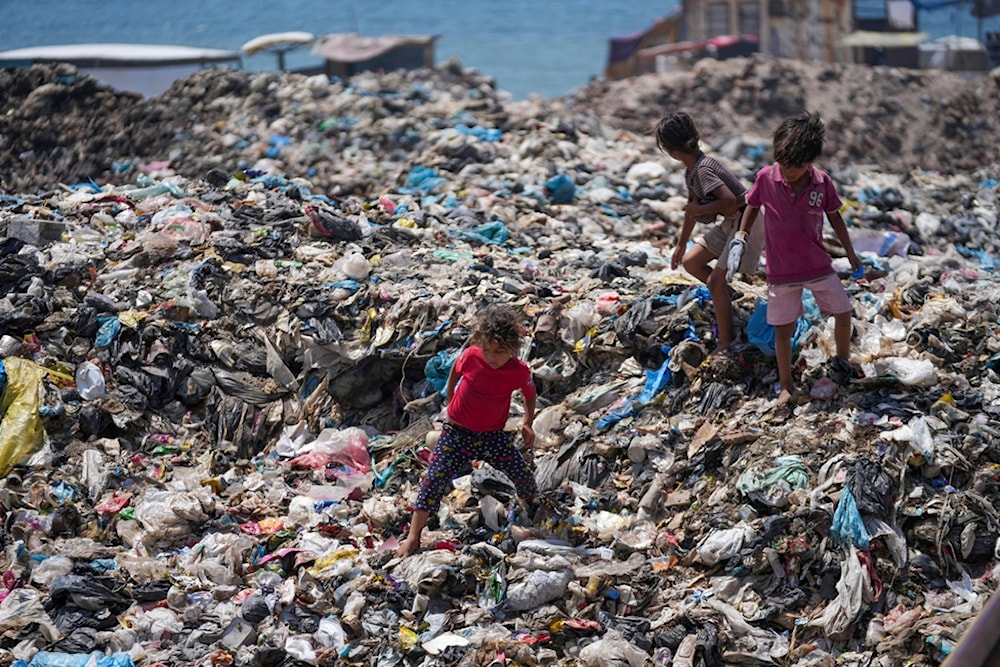Everyday in Gaza is the worst day the Strip has seen: UNRWA
An UNRWA spokesperson describes the dire living conditions Palestinians have to endure amid the war in Gaza.
-

Palestinian kids sort through trash at a landfill in Nuseirat refugee camp, Gaza Strip, Thursday, June 20, 2024 (AP)
Palestinians in Gaza are forced to camp out in bombed buildings and large piles of garbage, a UNRWA spokesperson said, slamming the "unbearable" conditions civilians in the Strip have to endure.
UNRWA's Louise Wateridge said the living conditions in the Gaza Strip, amid the war, were "extremely dire" and "unbearable", during a video call from central Gaza to reporters in Geneva.
Wateridge had been stationed in Gaza but left the strip for a few weeks until Wednesday, 26 June. When she returned to the Strip, she stressed that the situation had drastically deteriorated over the period during which she was gone.
"Today, it has to be the worst it's ever been. I don't doubt that tomorrow again will be the worst it's ever been," she said, adding that over the past nine months since the war began, the Gaza Strip has been destroyed.
Wateridge went to Khan Younis to be surprised by what she described as "skeleton buildings" that Palestinians have taken as shelter, despite the absence of water, sanitation, and food. She highlighted that people have been forced to cover up the holes in the walls with sheets, and are reliving themselves wherever they can because there are no toilets left in sites where they are sheltering.
On the delivery of humanitarian aid, the UNRWA official said the process was being ground to a halt due to the unavailability of fuel. She noted that relief organizations were unable to carry out humanitarian response missions because of the lack of fuel.
Wateridge was staying in a guesthouse around 150 meters away from a mountain of waste [100,000 tonnes] surrounded by makeshift tents Palestinians set up.
"With the temperatures rising, it's really adding misery to the living conditions," she said.
'Nothing like I'd seen before'
Before the war, clean-up organizations would remove all waste from Gaza's camps and dump it in landfill sites. However, the initiation of such process appears to be more difficult because of the absence of fuel, meaning cleaning trucks cannot operate to kickstart the process, even if access was granted.
Moreover, Wateridge said the aftermath of food insecurity has already manifested itself in the population. "When I see my colleagues, my friends here, they're visibly unrecognizable because having such unsustained access to food for so long, you start to age, you look unhealthy, your skin changes color," she grimly said.
Patients in Gaza's remaining hospitals are succumbing to infections due to the scarcity of protective gear and soap, even if they manage to survive severe blast injuries.
Health workers are confronted with heart-wrenching decisions, such as abandoning efforts to save a seven-year-old boy with extensive burns because of a shortage of bandages and the likelihood that he wouldn't survive.
These are among the distressing scenes witnessed by US doctors and nurses who have recently returned from the besieged Palestinian territory. They are now dedicated to raising awareness about the crisis and pressuring "Israel" to permit more life-saving supplies into Gaza.
"Whether or not a ceasefire happens, we have to get humanitarian aid. And we have to get it in sufficient volumes to meet the demands," Adam Hamawy, a former US Army combat surgeon, said as quoted by AFP in an interview after a medical mission to Gaza's European Hospital last month.
"You could give all you want, you can donate," added the reconstructive plastic surgeon from New Jersey. "But if these borders don't open up to allow that aid to get in, then it's just useless."
For the past 30 years, Hamawy has volunteered in regions ravaged by war and natural disasters, including the siege of Sarajevo and the earthquake in Haiti.
"But the level of civilian casualties that I experienced was beyond anything I'd seen before," stressed the 54-year-old.
"Most of our patients were children under the age of 14," he emphasized. "This has nothing to do with your political views."

 4 Min Read
4 Min Read










